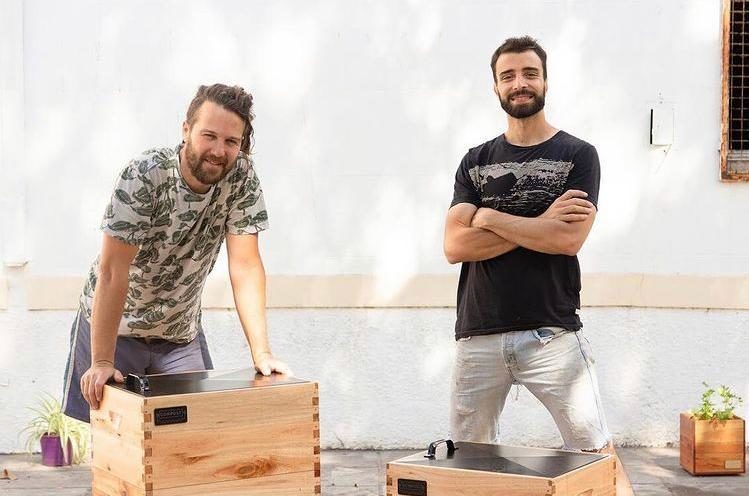




Keep this story going! Share below!
Yo Compost helps industries achieved full management circularity of their organic waste by using a combination of composting and anaerobic digestion techniques.
Yo Compost does this through customized modular systems installed in the plants' venues. This procedure minimizes waste transport, reduces Ghg emissions, and empowers employees in the process.
The waste problem is no news for the planet, and Argentina is no exception. According to the World Bank, by the year 2050, there will be 3.40 billion tonnes of waste worldwide, and 44% of this waste is from organic material.
Argentinean law defines different kinds of waste generators. Yo Compost provides services for the “Great Generators” type as defined by law. Great Generators include companies, gated neighborhoods, supermarkets, among others. Great Generators have to comply with a specific waste management protocol and pay a larger fee for the service.
The solution provided by Yo Compost is a customized system that combines composting and anaerobic digestion technology and manages to reduce 30% of the total waste generated in each venue. The compost bowls' modular design and the anaerobic digester allow for easily adapting the system for each companies' needs.
The process starts by analyzing the quantity and kind of waste generated in the venue and then customized the proposal for that combination. Yo Compost oversees the whole process and is in charge of the training of the employees. After the system is set up, they keep the relationship through a maintenance program, including consultation if needed.

Like with many good stories, this one starts with two good friends, Nicolás and Santiago. One Wednesday, Nicolás visited Santiago at his house. Santiago told him that he was starting a business with some compost techniques, and that, in fact, he was pitching an idea to Nestlé that Friday. Santiago asked Nicolás to join in because he needed help. Nicolás got immediate express training in the subject matter. Thus, “Yo Compost” was born.
The system was later awarded the “AllTech” prize from the Ministry of Science Technology and Innovation, Commission of Scientific Investigation, the Biotechnological Investigation Institute of San Martin University, and the Argentinean Chamber of Biotechnology. This, to them, was confirmation that they were on the right path. Nicolás told us that, “winning the AllTech contest showed us that there was a great potential in the proposal of treating organic waste under a circular economy methodology. Yo Compost attracted a great deal of interest in companies since there is nothing like it designed for them.”
Yo Compost offers a step towards complete circularity in organic waste management for companies. The fact that the system is designed modularly, set up to fulfill the company’s specific waste needs, and installed within the company venue, reduces the costs of waste disposal significantly. The fact that organic waste is treated internally leaves only a small amount of waste for disposal. This means that logistics are reduced, including GHG emissions.
The composting and digestion system's setup has a training stage that involves all employees in the organization. During this stage, employees learn how to separate waste and get empowered. This project includes the organization as a whole and unites the company in their everyday actions towards a common goal.
Besides the significant waste management costs and waste reduction for the companies, the compost and anaerobic digestion system give a final product that can be used as fertilizer. In certain companies, the fertilizer is bagged and distributed among employees to take home for their gardens. Also, the anaerobic digester produces gas that can be used to produce clean energy to service the facility's external lighting or heating system.
The innovation tackles a specific business niche. Due to the established regulation regarding waste management for larger generators, companies are subject to high service providers' high fees. Yo Compost's proposal of running operations within the premises represents a significant cost reduction and an alignment with sustainable development goals.
The business has doubled in the last two years, which triggered a contract for bigger installations. During 2020, industrial activity has decreased, and so the service requirements. However, employees from those companies bought at-home compost, resulting in a 40% growth of this segment.
Yo Compost has grown 5% Y1, 15% Y2 and 25% Y3, with an annual turnout of $2494057,90, $1870543,42 and $1496434,74 respectively.
The environmental impact of Yo Compost derives from its innovative composting technique, which results in the reduction of waste generation, disposal, and GHG emissions. Also, for composting, you need to separate and sort waste; the inorganic part can be recycled accordingly.
The social impact can be appreciated in the employees' change of habits in their own houses regarding home-waste management. Nicolás told us that "usually employees get really excited with the process, and many of them adopt this habit and take it back to their own houses." The company acts as a catalyst for sustainable habits among employees and their families.
Get stories of positive business innovations from around the world delivered right to your inbox.
“Yo Compost” is a company that helps companies process their organic waste in their own venues with a combination of customized technologies.
The implementation of these systems also influences the companies' employees making them more conscious and responsible for their waste generation, management, and disposal, which is extended to their homes, families, and communities.